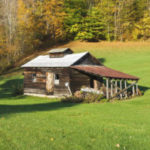The gold standard for fall foliage takes us to Vermont. With 75% of the state covered in forest and having the most land coverage of maple trees per capita, Vermont’s foliage season is the most vibrant. With its thousands of acres of alpine terrain, it is a popular destination for snowboarders and skiers. Trout fishing, lake fishing, ice fishing and hunting are also popular pastimes for residents and tourists alike. In the fall, hikers can catch some unforgettable views.
Vermont is attractive for more than just its environment. Vermont is also known for the manufacture and sale of artisan foods, fancy foods and novelty items such as Cabot Cheese, the Vermont Teddy Bear Company (where visitors can build their own Teddy Bear), Burton Snowboards and Ben and Jerry’s Ice Cream (where tours end by tasting your favorite flavor).
Each year, maple lovers travel to St. Albans to celebrate everything maple at the Vermont Maple Festival. Besides syrup, sugar makers also create maple jelly, maple granola, maple mustard, maple coated nuts, maple grilling sauce and maple BBQ sauce, just to name a few.
As an historic leader in U.S. snow sports, Vermont is home to America’s first alpine snow tow, built over 8 decades ago on Woodstock farm in 1934. The state also had the first chairlift in the nation, built on Mt. Mansfield in 1940.
The geography of the state is marked by the Green Mountains, which run north-south up the middle of the state, separating Lake Champlain and other valley terrain on the west from the Connecticut River valley that defines much of the state’s eastern border. A majority of its terrain is forested with hardwoods and conifers and a majority of its open land is devoted to agriculture. The state’s climate is characterized by warm, humid summers and cold, snowy winters.
Business Climate
As of 2015, Vermont continued to be the leading producer of maple syrup in the U.S. producing over 1.3 million gallons. This relatively small state generates 42% of the country’s maple syrup.
Tourism is an important industry in Vermont. Some of the largest ski slopes in the U.S. are located in the state. A true winter destination, Vermont is home to 19 alpine ski resorts, boasting both alpine and Nordic trails. Other areas designed to attract tourists are Vermont’s state parks, historic sites, museums, golf courses, and boutique hotels with spas.
Dairy Farming is the primary source of agricultural income. Eighty percent of open land is controlled by dairy farms.
Tax Climate
The top individual income tax rate is 8.75% and the top corporate income tax rate is 8.5%.
Apportionment: Vermont taxpayers apportion income tax using a double weighted sales formula.
Vermont has adopted market-based sourcing for sales of intangibles.
Sales Tax Structure
The state sales tax rate is 6%. The average local sales tax rate is 0.22%. Therefore, the combined rate is approximately 6.22%.
Vermont sales and use tax is imposed on the sale, lease, license, rental or use of specified digital products. Prewritten computer software delivered electronically is subject to sales and use tax in Vermont. Custom computer software delivered in any manner is not subject to Vermont’s sales and use tax. Software as a Service (SaaS) is not taxable in Vermont. How products are produced, sold and delivered is critical to determining the tax status.
Vermont has an economic nexus law where if an out of state seller sells $100,000 or 200 transactions worth of merchandise into the state, sellers need to collect and remit sales tax on those transactions. Sales of intangible personal property, products transferred electronically, or services in the state, provided the retailer regularly or systematically solicits sales from in state customers, are included in the threshold. Exempt sales and exempt services are also included in the threshold. However, businesses that only sell tax-exempt items into Vermont aren’t required to register for a sales tax account. The threshold applies to the preceding 12-month period and should be reevaluated quarterly. This legislation was enacted as of July 1, 2018.
A marketplace facilitator must collect and remit the sales tax on retail sales in Vermont by marketplace sellers through the marketplace if, during any 12-month period, it facilitated sales by marketplace sellers to destinations in Vermont of at least $100,000 or totaling at least 200 transactions. This legislation was enacted as of June 1, 2019.
Many states have annual sales tax holidays, during which certain items the state wants to promote the purchase of (like school supplies emergency preparedness supplies, or energy efficient appliances) can be purchased sales tax free. Vermont, however, does not currently have any scheduled sales tax holidays.
Our team at Miles Consulting Group is always available to discuss the specifics of your situation, whether in Vermont or other U.S. States, and help you navigate the complex tax structures arising from multistate operations. Call us to help you achieve the best tax efficiencies.
Random Facts
- The state capital is Montpelier, the least-populous state capital in the United States.
- The Vermont Teddy Bear Factory, located in Shelburne, is one the most popular attractions in the state.
- Vermont is known for having over 100 19th Century covered bridges.
- It is the 7th coldest state in the country.
- The state receives between 2,000 – 2,400 hours (83 to 100 days) of sunshine annually.
- Lake Champlain, the major lake in Vermont, is the sixth largest body of fresh water in the United States.
- The name Vermont likely comes from the French les Vets Monts, meaning “the Green Mountains.”















